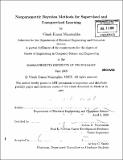Nonparametric Bayesian methods for supervised and unsupervised learning
Author(s)
Mansinghka, Vikash Kumar
DownloadFull printable version (17.11Mb)
Alternative title
Nonparametric Bayesian models for unsupervised learning
Other Contributors
Massachusetts Institute of Technology. Dept. of Electrical Engineering and Computer Science.
Advisor
Joshua B. Tenenbaum.
Terms of use
Metadata
Show full item recordAbstract
I introduce two nonparametric Bayesian methods for solving problems of supervised and unsupervised learning. The first method simultaneously learns causal networks and causal theories from data. For example, given synthetic co-occurrence data from a simple causal model for the medical domain, it can learn relationships like "having a flu causes coughing", while also learning that observable quantities can be usefully grouped into categories like diseases and symptoms, and that diseases tend to cause symptoms, not the other way around. The second method is an online algorithm for learning a prototype-based model for categorial concepts, and can be used to solve problems of multiclass classification with missing features. I apply it to problems of categorizing newsgroup posts and recognizing handwritten digits. These approaches were inspired by a striking capacity of human learning, which should also be a desideratum for any intelligent system: the ability to learn certain kinds of "simple" or "natural" structures very quickly, while still being able to learn arbitrary -- and arbitrarily complex - structures given enough data. In each case, I show how nonparametric Bayesian modeling and inference based on stochastic simulation give us some of the tools we need to achieve this goal.
Description
Thesis (M. Eng.)--Massachusetts Institute of Technology, Dept. of Electrical Engineering and Computer Science, 2009. Includes bibliographical references (leaves 44-45).
Date issued
2009Department
Massachusetts Institute of Technology. Department of Electrical Engineering and Computer SciencePublisher
Massachusetts Institute of Technology
Keywords
Electrical Engineering and Computer Science.